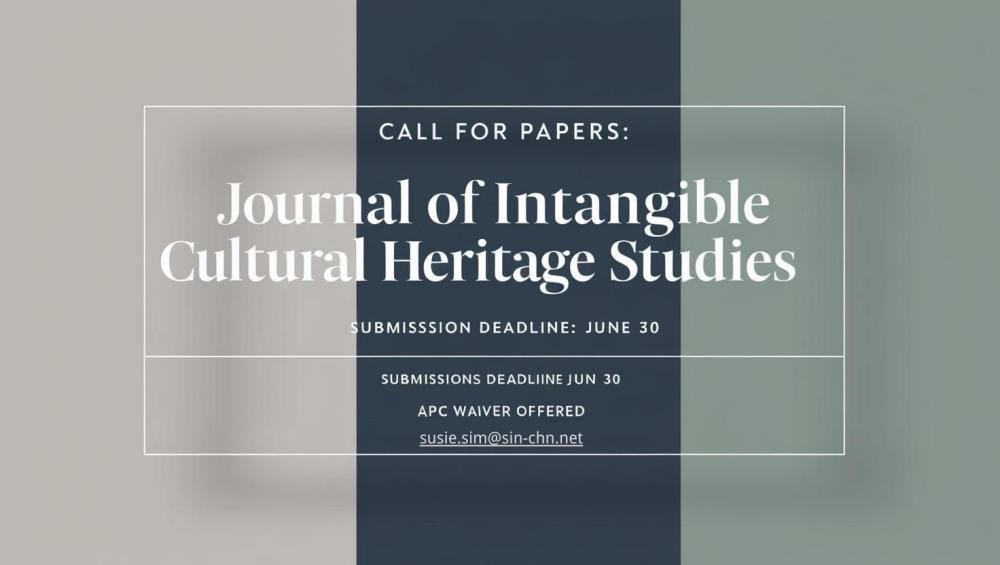
Description
The Journal of Intangible Cultural Heritage Studies (JICHS) is a peer-reviewed academic journal focused on advancing research in the preservation, study, and promotion of intangible cultural heritage (ICH). It provides an interdisciplinary platform for scholars, practitioners, policymakers, and communities to explore ICH's significance in the modern world. The journal covers a wide range of topics, including ICH's preservation, transmission, revitalization, and its role in fostering cultural identity and social cohesion. By encouraging global perspectives and collaboration across anthropology, sociology, cultural heritage, and policy studies, the journal aims to promote sustainable ICH preservation for future generations.
Announcements
Latest Articles
-
 Open Access
Open AccessArticles
Beyond ceremony: The doctoral sword and the living history of FinlandNicholas Rowe
Journal of Intangible Cultural Heritage Studies, 1(1), 2024, 2025, DOI:
Abstract:
This study investigates the under-examined Intangible Cultural Heritage (ICH) of Finland’s doctoral sword, which is a key symbol within its unique conferment ceremony. The ceremony is recognized by UNESCO and celebrates academic achievement. But the rich historical and cultural significance of the sword and Finnish academic dress more broadly remains largely unexplored and often relegated to a niche academic audience. This research traces the sword’s origins beyond its popular connection to figures like the artist Akseli Gallén-Kallela, and back through its evolution from Swedish and Russian traditions to recontextualize its contemporary interpretations. The findings reveal a significant gap between the wealth of historical context and the limited understanding of this ICH, even within Finland. The fact that this history was revealed through independent inquiry highlights a missed opportunity for broader cultural engagement by key stakeholders. This article argues for a more robust promotion of ICH, aligning with UNESCO’s Convention for the Safeguarding of the Intangible Cultural Heritage. It advocates that initiatives such as collaborations between cultural institutions, researchers and media producers can effectively raise awareness at relatively low cost, enhancing appreciation and ensuring the vitality of this heritage for present and future generations. The article urges responsible bodies to move beyond treating ICH as a hidden, archived resource and to actively fulfill their obligations under the UNESCO charter. By making the intangible tangible and widely accessible, this study emphasizes the importance of actively promoting ICH to foster a deeper understanding of national identity and cultural history, exemplified by the case of Finnish academic dress.
-
 Open Access
Open AccessArticles
Funeral feast in Hong Kong: A vanishing and transforming unattended riteChun Chiu Stanley Ng
Journal of Intangible Cultural Heritage Studies, 1(1), 1474, 2025, DOI:
Abstract:
The Hong Kong Government formally announced the first intangible cultural heritage (ICH) inventory of 480 items on 17 June 2014. “Traditional Funeral Rites” is included in the category of “social practices, rituals, and festival events” with the inventory code of 3.54. The consolation feast (Gaai Wai Zau) and the funerary feast when the mourning period is over (Ying Hung Feast) are mentioned but with limited elaboration. This paper examines the significance and evolving nature of funeral feasts in modern Hong Kong Chinese, which covers over 90% of the population. Despite the erosion of traditional rituals due to urbanization and the fast-paced lifestyle, the funeral feast, particularly the Ying Hung Feast or “纓紅宴,” remains a common practice for community dialogue during funerals. The study explores the social and psychological functions of funeral feasts in different cultural contexts, emphasizing their role in fostering connections with the deceased and the living, as well as the religious symbolism associated with specific dishes. It also investigates the impact of commercialization and homogenization on funeral practices, considering government policies and private sector influence. In Hong Kong, where efficiency-driven tensions prevail, funeral customs have been standardized and streamlined. Cremation has become more prevalent, and most funeral ceremonies are completed within a two-day timeframe. However, the funeral feast continues to play a vital role, mediating social relationships within families, faith communities and the wider community. By examining funeral feasts in the context of modern Hong Kong, this study sheds light on the changing dynamics of funeral rituals in response to urbanization. It highlights the unique cultural blend of East and West in Hong Kong, resulting in the emergence of “ritual buffets” where individuals can personalize their rituals while respecting the beliefs and practices of others. It conveys the idea of customization and personalization within the context of communal gathering. This research contributes to a deeper understanding of the social functionality and meaning of funeral feasts in contemporary Hong Kong society, emphasizing their continued relevance even as funeral customs undergo transformation in the face of modern urban life.



 Open Access
Open Access

 Submit a Paper
Submit a Paper